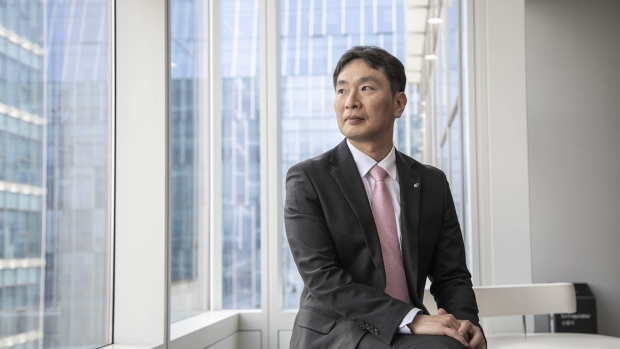Mar 28, 2023
Korea Can Consider Lifting Short Selling Ban in 2023, Watchdog Says
, Bloomberg News

(Bloomberg) -- South Korean authorities will consider lifting a short-selling ban as early as this year if conditions are met, the nation’s financial watchdog chief said, acknowledging that the restriction is impeding foreign investors from buying local stocks.
“If the dust of the financial turmoil is cleared within a couple of months, we will look into deregulation of short selling, hopefully this year,” Lee Bokhyun, governor of the Financial Supervisory Service, said in his first media interview since taking the office in June 2022. “We will definitely take some measures to make the market more attractive to foreign investors.”
A full resumption of short-selling practices would help Korea get an upgrade to developed-market status in MSCI Inc.’s equity gauge, enabling a broader pool of foreign funds to buy the nation’s stocks. The country is “seriously dedicated” to achieving that status, which will happen hopefully next year, according to Lee.
Korea in 2021 partially lifted a curb on sales of borrowed stocks that was imposed during the pandemic to reduce market volatility. It now allows such trades for large-cap shares on the Kospi 200 and Kosdaq 150 indexes. The nation’s influential retail investors are opposed to a full removal of the restrictions, fearing the practice may trigger greater price swings.
Read: Korea Braces for More Loan Failures Amid Global Banking Slump
On broader financial risks, Lee said the slump in Korea’s property market may lead to defaults on some project-financing loans, but added that policymakers have put in place measures to cope following an unexpected credit crunch last year.
The country is also unlikely to experience the likes of Silicon Valley Bank’s collapse as its lenders have sufficient buffers and limited securities exposure. With banks’ deposits mostly consisting of retail accounts in small amounts, the risk of a massive bank run is also low, he added.
Here are some other key comments that Lee made in a wide-ranging interview:
Crypto Regulation
- When asked where Terraform Labs’ co-founder Do Kwon should be extradited, Lee said Kwon should be prosecuted in Korea, adding that the FSS has been working with the prosecutors’ office since the collapse of the TerraUSD stablecoin and its sister coin Luna
- “I want them to be prosecuted here because it will be a strong case for the market and the legal society”
MSCI DM INDEX
- Lee said the country is “seriously dedicated” to getting upgraded to MSCI’s developed market index from emerging market status, which will happen “hopefully next year”
- “We are quite well aware that we need to do more to meet the criteria. This year, 2023, will be a long year for us to deregulate obstacles”
- The FSS will make greater effort to protect minority shareholders and take measures to make Korea’s markets more attractive and friendly for foreign investors
FX Trading
- Lee said he wants to see the won traded more frequently and freely onshore and offshore, and enabling that will be part of government efforts to give foreigners greater access to Korea’s market
- Extending onshore won trading hours is an indirect way of boosting foreigner access
- The FSS will study activity in the onshore interbank FX market before considering steps to boost offshore trading
- NOTE: Korea has earlier announced plans to extend onshore won trading hours and allow some foreign firms to participate directly in the local interbank FX market. Still, offshore trading of the won continues to be banned
- Korea’s inclusion to World Government Bond Index is more likely to happen later this year than at the end of March
--With assistance from Jaehyun Eom, Hooyeon Kim, Andy Hung, Sabrina Mao, Heba Moussa von Thun, Rika Yoshida, Jeong-Ho Lee, Sam Kim and Sangmi Cha.
(Adds more comments in fifth and sixth paragraphs.)
©2023 Bloomberg L.P.





